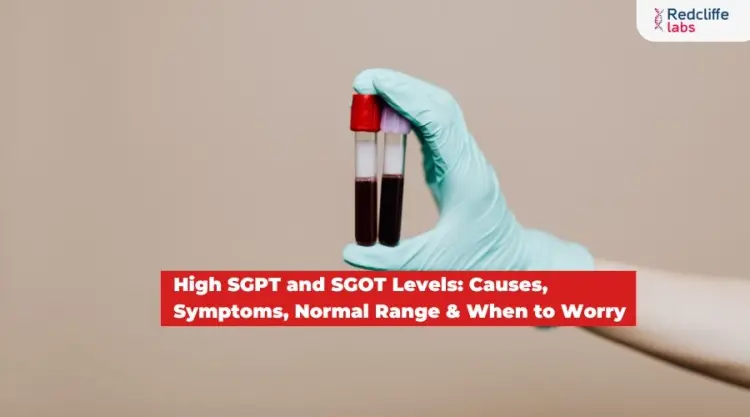Blood
Unlock special
discount on
this package
Login to Unlock 🔓
Also Known As
fragment D-dimer Test, Fibrin Degradation Fragment Blood Test, Disseminated Intravascular Coagulation ScreeningBooking Benefits Unlocked Worth FREE 799

Report Consultation

Diet Plan
*Available once your report is generated.
At Redcliffe Labs, we have a single goal: to give India its right to quality diagnostics.
Customers served
Tests Processed Everyday
Cities
Collection Centres
World Class In-house Labs
Home Collection Experts
1 Test Parameters
D-Dimer
1 PARAMETER INCLUDED
1 PARAMETER INCLUDED
- D-Dimer
Helps you know your test better
Who all are eligible for D Dimer test?
- People with deep vein thrombosis and pulmonary embolism, which are blood clot-related disorders.
- People with a family history of blood clotting.
- In the cases of knee replacement, broken foot, and leg, antiphospholipid syndrome, major surgery, and some cancers.
- During the COVID-19 infection.
Why take D Dimer blood test in Delhi?
- The test helps to detect serious blood clot disorders like deep vein thrombosis, pulmonary embolism, and disseminated intravascular coagulation (DIC).
- In the case of the COVID-19 infection, it shows the clot in the body.
What are the benefits of D Dimer test?
- It is used to check how the treatment is working, especially in the case of disseminated intravascular coagulation.
- It helps the doctor to figure out blood clots and to prevent life-threatening diseases.
- It’s also used to check on the treatment and how the treatment is working.
- It is also helpful in various infections, certain cancers, and liver diseases.
- This is very useful in monitoring the COVID-19 infection and its progression in the patients.
- It helps with timely intervention, hence lowering the fatality rate.
- The test is critical in the event of a pandemic (COVID-19).
Top Booked Health Checkup Packages
Reports in 13 hours
|Parameters 94
Reports in 13 hours
|Parameters 89
Reports in 13 hours
|Parameters 96
Reports in 13 hours
|Parameters 96
Reports in 13 hours
|Parameters 90
Helps you know your test better
Q. How can I book my test?
Q. In how much time will I get my test report?
Q. Where can I see or get my test results?
Q. Is home sample collection available for D Dimer test?
Verified by Medical Expert

WRITTEN BY
Komal Daryani

MEDICALLY REVIEWED BY
Dr. Mayanka Seth
What is D dimer test?
D dimer blood test didn’t seem known to many when Covid-19 wasn’t there! It was after the onset and spread of the coronavirus all across the globe that the significance of the dimer test became popular. A D-dimer test in Delhi is performed to look out for a blood clotting disorder. Blood clotting disorders are inclusive of Deep vein thrombosis (DVT), a condition of blood coagulation that's deep inside a vein. These clots usually leave a significant impact on the lower legs, but they can also affect other parts of the body.
D-dimer is a blood test, the sample of which is taken on the same tube as a coagulation profile test or INR Test. It needs the tube to be filled to the accurate levels. A few milliliters of blood sample is drawn from a vein.
D Dimer Test Details: -
| Name Of The Test | D-Dimer Test in Delhi |
| Sample Type | Blood |
| Number Of Tests | 1 |
| Actual Test Price | ₹1382 |
| Discounted Test Price | ₹1099 |
| Home Sample Collection | Available |
| Fasting Before Test | No Fasting Required |
| Get Reports Within | Same Day |
What is the need of a dimer blood test in Delhi?
D dimer test is usually recommended and advised when there’s a possibility of a deep venous thrombosis or pulmonary embolism. The dimer is used as a risk-differentiating test, because it may make additional testing necessary or unnecessary in patients. For example, a patient with reduced risk of DVT (a blood clot in the leg) or PE (a blood clot in the lung), with a negative (normal) D-Dimer test, may not require further testing like a Doppler Ultrasound of the legs or a CT Pulmonary Angiogram (CTPA).
The test is less effective at preventing clotting medical conditions in the body when the clinical risk is at moderate or high levels. The clinical possibility called the pre-test possibility, is based on a compound impression from the medical experts, often integrating certain items, which may have a points system assigned as a guide. To be more particular, patients with blood clot-related problems should mandatorily get their D-dimer test done. The requirements of this test are,
- It is helpful in assessing the severity of a medical condition
- It is also helpful in easily assessing the risks of pulmonary diseases
There are certain other necessities of a D-dimer test. One of the most mentionable requirements of this test is its wide usage in the days of the ongoing pandemics. Your doctor may recommend a D-dimer test to people experiencing symptoms of a blood clotting condition, which include:
- Deep vein thrombosis (DVT)
- Pulmonary embolism (PE)
- Disseminated intravascular coagulation (DIC)
- Stroke
Medical experts usually conduct D-dimer tests in an emergency room or other hospital setting. Some other conditions or symptoms for which the D dimer test is performed are namely:
- Sever backache
- Unexplained and continuous sweating
- Tachycardia
- Dizziness or fainting
- Coughing
- Sharp chest pain
Requirements and process of D dimer test
There is as such no special requirement for patients to follow before undergoing a D dimer blood test in Delhi. An experienced and skilled phlebotomist will draw a blood sample from a vein in the arm, with the help of a small needle. After inserting the small needle, a small amount of blood is collected into a vial. With taking the blood sample, you will feel a little pinch or sting at the site of prick or when the needle goes in or out of the skin.
D dimer test results and interpretation
D-dimer is one of the outputs of blood clot breakdown that can be evaluated and examined in the bloodstream. Normally, the protein is available in small amounts because there is a persistent turnover of tiny clots producing and being broken down by the body’s natural phenomenon.
D-dimer negative test results (normal):
Below a set cut-off estimate, ascertained by the laboratory and the brand of diagnostic testing services, a small amount of D-dimer in the blood is very uplifting, in low-risk patients. It indicates that there is not much coagulation turnover in the body.
D-dimer positive test results (abnormal):
This may be a result of unexplained inflammation, long-term bed rest, post-surgery complications, and is more probable with aging. A significant number of people with a positive d-dimer test result may not be diagnosed with DVT or PE; it simply means that these conditions cannot be eliminated to a high degree of inevitability.
The true value of a D-dimer test is in low-risk patients when the results are normal or negative. Unfortunately, if the D dimer test results are positive, further testing is recommended to exclude a DVT or PE. In cases where D-dimer test results are abnormal, the doctor recommends the person to undergo one or more imaging tests to look for the presence of a blood clotting condition and where the blood clot(s) are. Imaging tests include after abnormal D-dimer test results are:
- Doppler ultrasound: It is an imaging test in which sound waves are used to create images of the veins.
- Computed tomography (CT) angiography: CT angiography is another effective imaging test that is done once abnormal test results of D-dimer are found. A special dye is injected into the veins which help show up blood vessels on a special type of advanced X-ray machine.
- Lung ventilation-perfusion (V/Q) scan: A lung VQ scan is an imaging test in which a ventilation scan is used to evaluate airflow in the lungs and perfusion (Q) scan to check where blood flows in the lungs. V/Q scanning tests make use of certain small and safe amounts of radioactive substances to assist a scanning equipment check how well air and blood move through the lungs.
How can I find a D dimer test near me in Delhi?
Get access to easy booking and convenient home sample collection through Redcliffe Labs. Book a D dimer lab test in Delhi online and get quick and easy access to reports within 24-48 hours. Know more about your bodily functioning with Redcliffe Labs’.
D dimer test price in Delhi
Want to know the cost of the dimer test? D dimer test price at Redcliffe Labs’ is affordable and pocket-friendly as compared to other diagnostic units. D dimer test cost is ₹ 1099.

Note: We also offer D-Dimer Test PAN India. Please call the number 8988988787 to check the availability of our services in your area.
What are the risks associated with the D dimer test?
Blood tests are a very common and integral part of diagnostic testing. There’s very little or no risk of getting blood tests as D dimer done. A person may experience slight tenderness or a bruise at the site of the prick, but this usually goes on its own.
5 Simple Steps to Manage Your Health with Redcliffe Labs
Quick, Simple & Convenient; trusted care delivered to your doorstep.

Start Your Online Booking
Open the Redcliffe Labs website/app. Select the test or package and enter your details. Schedule the service for your preferred slot.

Live Tracking
Stay updated with real-time tracking for a smooth and timely home sample collection.

Sample Collection
Our certified experts ensure a smooth, hygienic, and fully compliant sample collection experience.

Doctor-Verified Smart Reports
Every report is clinically checked by expert doctors and shared with smart, actionable insights.

Your Health Journey Continues Post Reports
Consult with our expert medical team to get actionable insights to improve your health.
Nearby Labs(9)
Redcliffe Labs Rohini - Delhi
Redcliffe Collection Center
Redcliffe Collection Center
Redcliffe Collection Center
Redcliffe Collection Center
Redcliffe Collection Center
Redcliffe Collection Center
Redcliffe Collection Center
Redcliffe Collection Center
Frequently Asked Questions
Does the D dimer test work for Covid-19?
Can you naturally lower the D dimer?
- Vitamin E
- Garlic
- Cassia cinnamon
- Turmeric
- Ginger
- Cayenne pepper
- Ginkgo biloba
- Grape seed extract
When are the test results of D dimer considered high?
What are the causes of increased D-dimer?
When will I receive my reports?
Can I book a D Dimer Test near me in Shimla?
Can I book a home collection for a D Dimer Test in Shimla?
Health Articles & Blogs
My Health
Stay informed with our expert health articles and blogs. Explore comprehensive guides on diseases, nutrition, preventive care, and wellness tips to help you make better health decisions.
Importance of Heart Health Before Pregnancy: Everything You Need to Know

Migraine Treatment at Home: Effective Ways to Relieve Migraines Naturally

High SGPT and SGOT Levels: Causes, Symptoms, Normal Range & When to Worry

Brain Hemorrhage Symptoms: Early Warning Signs, Types, Causes & When to Seek Emergency Care

What is SGPT in Blood Reports? Everything You Need to Know

Capsicum (Shimla Mirch) 101: Benefits, Nutritional Value, Uses and More

Normal Calcium Levels: Range, Symptoms & Causes of Imbalance

Home Remedies to Get Rid of Cold in Babies: Safe & Natural Relief for Infants
Discover safe home remedies to get rid of cold in babies. Learn natural and gentle relief methods to ease cough, congestion, and cold symptoms in infants.
Explore My Health
